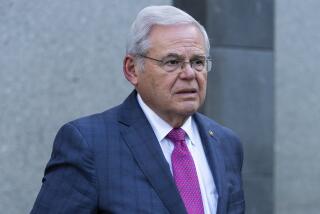Jury in Bell corruption trial may be deadlocked
A court spokeswoman said Thursday the jury in the Bell corruption case appears to be deadlocked.
“The jurors may be at an impasse,” said Patricia Kelly, a spokeswoman for L.A. County Superior Court.
Jurors sent a note to the judge Thursday morning, and all the attorneys in the case were called in.
Six former Bell City Council members are accused of stealing public money by paying themselves extraordinary salaries in one of Los Angeles County’s poorest cities.
Luis Artiga, Victor Bello, George Cole, Oscar Hernandez, Teresa Jacobo and George Mirabal are accused of misappropriation of public funds, felony counts that could bring prison terms.
They were arrested in September 2010 and have been free on bail.
The nearly $100,000 salaries drawn by most of the former elected officials are part of a much larger municipal corruption case in the southeast Los Angeles County city in which prosecutors allege that money from the city’s modest general fund flowed freely to top officials.
The three defendants who testified painted a picture of a city as a place led by a controlling, manipulative administrator who handed out enormous salaries, loaned city money and padded future pensions. Robert Rizzo, the former adminstrator, and ex-assistant city manager Angela Spaccia are also awaiting trial.
The four-week trial of the former council members turned on extremes.
Deputy Dist. Atty. Edward Miller said the council members were little more than common thieves who were consumed with fattening their paychecks at the expense of the city’s largely immigrant, working-poor residents.
Miller said the accused represented the “one-percenters” of Bell who had “apparently forgotten who they are and where they live.”
Defense attorneys said the former city leaders -- one a pastor, another a mom-and-pop grocery store owner, another a funeral director -- were dedicated public servants who put in long hours and tirelessly responded to the needs of their constituents.
Jacobo testified that Rizzo informed her she could quit her job as a real estate agent and receive a full-time salary as a council member. She said she asked City Attorney Edward Lee if that was possible and he nodded his head.
“I thought I was doing a very good job to be able to earn that, yes,” Jacobo said.
Cole said Rizzo was so intimidating that the former councilman voted for a 12% annual pay raise out of fear the city programs he established would be gutted by Rizzo in retaliation if he opposed the pay hikes.
The defense argued that the prosecution failed to prove criminal negligence -- that their clients knew what they were doing was wrong or that a reasonable person would know it was wrong.
The attorney for Hernandez, the city’s mayor at the time of the arrests, said his client had only a grade-school education, was known more for his heart than his intellect and was, perhaps, not overly “scholarly.”
Prosecutors argued that the council members pushed up their salaries by serving on city boards that rarely met and, in one case, existed only as a means for paying them even more money.
Jurors were also left to deal with the question of whether council members were protected by a City Charter that was approved in a special election that drew fewer than 400 voters.
Defense attorneys say the charter allowed council members to be paid for serving on the authorities.
But the prosecutor argued that the charter -- a quasi-constitution for a city -- set salaries at what councils in similar-sized cities were receiving under state law: $8,076 a year. Because council members automatically serve on boards and commissions, the district attorney said the total compensation for all of each council member’s work was included in that figure.
More to Read
Sign up for Essential California
The most important California stories and recommendations in your inbox every morning.
You may occasionally receive promotional content from the Los Angeles Times.










